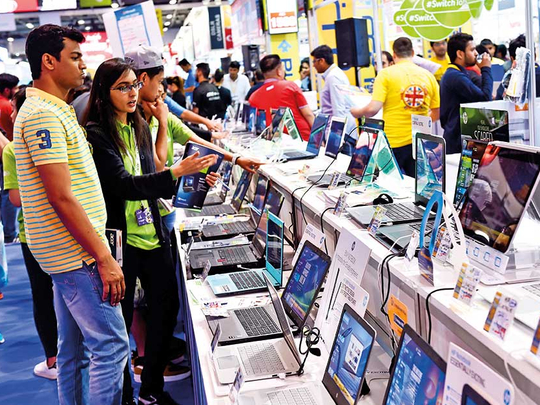
Dubai: PC manufactures are seeing a silver lining by end of this year after the industry suffered a 2.8 per cent decline in the UAE shipments in the second quarter due to the ongoing shift in end-user spending toward smartphones and, to a less extent, detachable tablets.
Total shipments stood at 315,198 units in the second quarter of this year compared to 324,293 units a year ago.
“The buying cycles are getting longer now. We are expecting the market to bottom out this year and getting back to slight growth next year,” Rajat Rallan, senior merchandising manager for Dell Middle East, Turkey and North Africa, told Gulf News.
“We have seen double-digit declines in the past and now it has come to just a few percentage points. It is getting better. We are expecting to see a growth in the fourth quarter of this year”.
He said the UAE market had grown 1.6 per cent in the first quarter and the second quarter is more of a seasonal demand. The third quarter is expected to be better due to Gitex Shopper and the fourth quarter due to holidays.
Fouad R. Charakla, a senior research manager at International Data Corporation (IDC), told Gulf News that detachable tablets [tablets with detachable keyboards] are gaining importance. Otherwise, the bigger screen sizes of today’s smartphones continue to cannibalise spending on traditional slate tablets also.
Most importantly, he said the general slowdown in spending from both commercial and consumer end-user segments is also keeping the market slow.
“We had one of the best quarters in the UAE in terms of market share despite the market being relatively down,” said Narayanan Venkataraman, head of personal systems category for the Middle East and Saudi Arabia at HP Inc.
He said that the second quarter is more of a seasonality and the situation is not grave and it is anticipated.
Among the enterprise segment, he said that education and health care continue to be the prominent sectors while the trading segment is down due to the regional instability and oil prices and it may take some time to recover.
“The new convertible form factors when compared to traditional laptops are slowly gaining traction, as well as the gaming laptops amid from a low base. Fourth quarter is expected is to be more stable like the first quarter,” he said.
Charakla said that average selling price has grown two per cent due to the impact of component shortages for DRAM, solid state drives (SSDs) and LCD panels during the past two quarters.
Desktops took a big hit with a decline of more than 21 per cent while notebooks increased 3.6 per cent. “A shift towards mobility is happening in the commercial sector and that is why desktop sales took a hit. In the consumer market, the price hike has a greater impact as buying habits are more sensitive to price increases. Many consumers are willing to postpone their purchases until the price pressure eases,” he said.
Raglan said that consumers in the Middle East are buying higher-configuration machines for a higher price to keep it for a longer period. “Gaming PCs are growing in the entry-to mid-level segment. Definitely, it is a growing segment and retailers are ready to invest in showroom spaces for displaying gaming laptops,” he said.
At the same time, tablet sales declined 18.7 per cent to 307,184 units compared to 377,778 units a year ago.
But Charakla said that detachable tablets grew 18.8 per cent but still contribute less than 10 per cent of the total sales. “The bigger screen sizes of today’s smartphones continue to cannibalise spending on traditional slate tablets,” he said.
He said that more than 60 per cent of the slate tablet sales in the UAE come from screens with seven inches. As consumers are reluctant to replace their existing devices and the majority of the tasks that were previously performed on tablets have now shifted to bigger smartphones.
Smartphones and tablets have proven to be more convenient alternatives when compared to PCs for communication, social media usage, etc.











